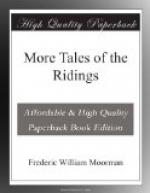“‘Twere nobbut a two-three minutes’ walk, an’ afore vara lang I were sittin’ anent t’ rocks, an’ t’ mooin were glisterin’ through t’ esh-trees on to t’ watter. Efter a while I felt a bit sleepy; ‘twere t’ nippy air, an’ mebbe t’ seet o’ t’ fallin’ watter dazed my een. Onygates, I fell asleep an’ slept for better pairt of an hour. When I wakkened t’ mooin were well-nigh settin’, an’ I could see that t’ cockleet were coomin’ away i’ t’ east. So I reckoned I’d get back to my bed. But just then I saw summat movin’ about on t’ other side o’ t’ beck. At first I thowt it were nobbut a sheep, but when I’d keeked at it a bit langer I knew it weren’t a sheep at all; ‘twere a lass o’ about t’ same size as misel.”
At this point in the story alertness of mind was depicted on the face of every listener. Joe Moon’s tongue, as agile as a lizard’s, had up to now been revolving like a windmill round the lower half of his face, questing after treacly crumbs which had adhered to his cheeks; but at the mention of the girl by the waterfall it ceased from its labours, and the tightly closed mouth and straining eyes showed that he was not losing a word.
“Queerest thing about t’ lass were this,” Grannie continued, “shoo were nakt, as nakt as ony hen-egg, an’ that at five o’clock on a frosty April morn. Eh! but it made me dither to see her stannin’ theer wi’ niver a shift to her back. Well, I crept close to t’ gert stone an’ kept my een on her. First of all shoo crept down to t’ watter an’ put her feet intul it, an’ gat agate o’ splashin’ t’ watter all ower her, just like a bird weshin’ itsel i’ t’ beck. Then shoo climmed up to t’ top o’ t’ nab that were hingin’ ower t’ fall an’ let t’ watter flow all ower her face an’ showders. I could see her lish body shinin’ through t’ watter an’ her yallow hair streamin’ out on both sides of her head. Efter a while shoo climmed on to a rock i’ t’ beck below t’ fall an’ gat howd o’ t’ bough of an esh. Shoo brak off t’ bough an’ shaped it into a sort o’ a wand an’ started wavin’ it i’ t’ air.
“Now I ought to have telled you that up to now iverything i’ t’ cove were as whisht as t’ grave. I could hear t’ cocks crowin’ up at our house, but all t’ wild birds were roostin’ i’ t’ boughs or on t’ grund. But no sooiner did t’ lass wave her wand ower her head than t’ larks started singin’. T’ meadows an’ cow-pasturs were full o’ sleepin’ larks, an’ then, all on a sudden, t’ sky were fair wick wi’ em. I harkened tul ‘em, ay, an t’ lass harkened an’ all, an’ kept wavin’ t’ wand aboon her head. I doubted ‘twere t’ lass that had wakkened t’ larks an’ gotten ’em to sing so canty. Efter a while shoo lowered t’ wand a bit an’ pointed to t’ moors, an’ then, by t’ Mess! curlews gat agate o’ singin.’ Soom fowks reckons that t’ song o’ t’ curlew is dreesom an’ yonderly, but I love to harken to it i’ t’ springtime when t’ birds cooms back to t’ moors frae t’ sea. An’ so did t’ lass. When shoo heerd t’ curlews shoo started laughin’ an’ dashed t’ watter about wi’ her foot.




